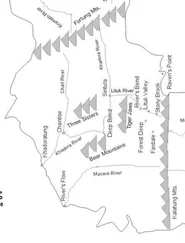You're telling me we could get the floorboards to creak whenever someone takes a step on them? That's what I'm telling you.
Unreal. The wood could thump when you touch it. The shutters could clack. Pinging glass. That's it. Every object will make its right noise. This will totally flip people out. Their ears will convince them of the thing they're touching.
Know what we really need? Music.
She cocked a head at the suggestion. Trying to figure out what he was after. Then she figured. You know what, Stevie? We really don't. Music is not what we really need. It's the last thing in the world, in fact.
He looked at her, already hearing. As if the room were already dosed in superfluous sonatas.
Realization took hold of her face. She fought back at the assault. Oh fuck. Fuck it. You brought me all the way out here, after all these years…? Just to get me to… just to try to fix me back up with …?
She crumbled at the prospect of losing the greatest Etch-A-Sketch a girl had ever been given. She hid her face in her hands, up to her ears.
No, his look said, too soft to hear. Not to fix you up. Not you per se. Zimmerman. To fix Ted. The one who really needed him. The one Spiegel loved, first of anyone.
The Therapy Room is a work in progress.
Its idea is as old as ideas themselves: to break the terror of existence by depicting it. Heights brought down to ground level, dried floods, cardboard invaders: a story of hurtful things that cannot hurt you any more than any story can.
Outside the Therapy Room, a white thirty-four-year-old neurasthenic female, Miss Muffet (not her real name), presents with acute, debilitating arachnophobia. After administering a history and physical, her doctors place Miss Muffet inside the palpable re-creation of a kitchen much like her own: a clean, well-lit Kenmore ensemble with lots of counter space. Just as M.M. grows comfortable in the surroundings, technicians bury her up to her midriff in spiders.
The patient's vitals spike off the charts. She screams and runs out of the representation, as if from the real evil. For the next two hours M.M. is a panting wreck, unable to go anywhere near the imaginary kitchen. This is a good sign. In order for the Therapy Room to work, the patient must credit it enough to dread it. Miss Muffet's gullibility makes her the ideal subject. She knows the nightmare of spiders is a fabrication. And still she believes.
As soon as the patient can calm down, they send her back in. This time, primed for the assault, telling herself that it's only an invention, she lasts a full thirty seconds. Miss Muffet laughs in cold terror after she reaches the exit. Her pulse returns to normal in half the time of her first exposure. She now knows she can escape the spiders anytime she wants. She can enter the kitchen, however horrible, and survive.
Real exposure can't teach her this, for real fear overwhelms all second tries. But the Therapy Room works at the limits of seeming. Belief gives way to evidence, spiders to spiderlike objects. Twelve exposures later, Miss Muffet takes to batting at her nemeses, frying them with the click of a joystick, racking up the kills like so many toy targets.
Out in the larger world, M.M. makes a miraculous parallel leap. For if the things she so lately took for threats turned out to be mere representations, how much more of a threat can the originals represent? Models reveal to her the model she has lived in. Symbols cure her of the fears those symbols stood for. Terror flattens into its empty sign.
The same cure promises help for all those disabled by the real. Burn victims will forget their pain, wrapped in a more vibrant light. Those paralyzed by fear of flying will make their connections. Post-traumatic stress sufferers, for whom no other therapy has worked, will skim the virtual canopies above firefights powerless to reach them.
When next M.M. sees a living spider, she rubs it out happily with her bare hands. The case history writes her final happy chapter: Miss Muffet successfully desensitized.
Every ten-minute chunk of May makes an eternity. But once the weeks are finally dead, you feel the month pass in memory in half a heartbeat. Time uses you; it lays you out. It advances glacially, gouging by inches your scarred inner continents. Then it vanishes, leaving behind no single landmark but white.
You kill the quarter-hours dune-ranging through the blankest Saharas, each kilometer of hard-won track wiped out by the wind as soon as you turn to look back. At huge intervals, oases punctuate the evacuated tracts. You head for whatever infrequent way stations you can scrape together.
Mother's Day, never marked by more than a week of low-level anxiety capped by an emergency call to FTD, swells to an international conference of sacred distraction. All day, the woman's face struggles to take shape. You fight for detail, work to recover the first sight your eyes ever recognized, the most familiar, most assumed, most beatific, nauseating, neglected, adored, abused. Hours pass trying to fix her features, to see past their gross lines, to zoom in beyond your usual myopia down to the local intricacies of cartilage, her smallest fleshy finials.
Her full-tipped nose swims into focus, your nose before its Anglo contamination. The pained laugh lines on the outskirts of her eyes deeping to plow cuts. Her chin's drumlins assume a detail that only enforced isolation could have given you. A haunted face, a hunted one. Framed in that copper coif of composure that it took you until the age of twelve to realize was not her natural color. Pahlevi copper. Before that, in pictures, Pahlevi blond. Westoxification at its finest. Hair color that would be hard to hide, even now, under the required head scarf. A face no longer welcome in the country of her birth, the same country that now bankrolls Sacred Conflict and their army of God's Partisans, the ones who have seized you, her baby, the flesh of her flesh.
All day long her muscles materialize, cling to the noble cheekbones, a grimace of pleasure peeking through the interdicting fear. Every brave smile apprises you of its bewilderment, the wild route of its arrival here. You make out the tuft of peach fur on her upper lip, there already in '51, the year that old Tavakoli and his family migrated to England in the wake of Mussadegh's nationalization of Anglo-Iranian Oil.
Three years later, in the returning Shah's wake, the freshly rechris-tened British Petroleum sought out her faithful father and reinstated him to his middle-management post. But by then your mother Shah-naz's lovely, peach-furred lip had captivated a handsome American serviceman loitering around London prior to his inevitable return to Iowa and a lifetime of agricultural extension lecturing. Veiled in white, in an incoherent Anglican ceremony where her whole displaced family did their best ferangi impersonations, your mother swore through that fleshy mouth to love, honor, and obey this American, to follow him into lifelong exile deep in a land that couldn't tell Iranian from Indonesian.
These features, this face: what could the domesticated prairie have looked like, through eyes so black and baffled? Not a question you've ever entertained, before Mother's Day inflicts you with time enough to entertain all questions. Isfahan, your mother's singsong once sang to you, is half the world. Growing up in Basra, Kuwait, and Doha could not have left too much room in her remaining half a world for a town like Des Moines.
And yet, the laughing, skittish voice tries again to tell you, I never felt at home until I came to the United States. The black eyes whose gaze you could never bear to meet dart away, caught in the compromise of something like truth. People in the Midwest are so friendly. So ready to take you in. By which she must have meant that Iowans, in their bounty, could not imagine how anyone would not want to be like them, given half a chance.
Читать дальше












